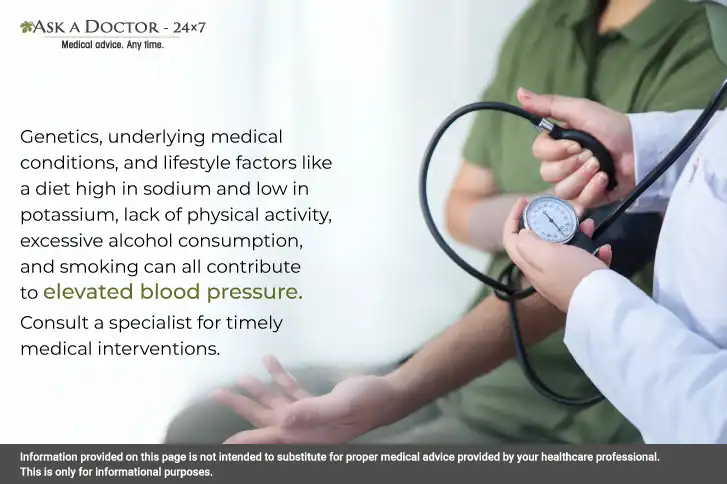Is My BP High?
"Is my blood pressure (BP) high?" I bet this question must have hit your mind every time you had a routine BP exam. You may not have hypertension or related symptoms, but still, your BP is almost always checked during every visit to the doctor. Do you know why?
Here is the answer:
- Hypertension is a common disease that may cause no symptoms at all.
- It is an easily modifiable ailment if identified in the early stages.
- High BP can alter the course of other diseases and may lead to a heart attack, kidney failure, or stroke.
Hence, regular measurement of BP is recommended in all adults aged 18 years or older. One can avoid its complications and many other adverse outcomes by maintaining normal BP.
Now, returning to the question: Is my BP high?

Here's what you must know about BP readings:
- BP is measured in units of pressure (millimeters of mercury or mmHg). An average of two closest BP readings out of three, taken on alternate days, at the same time of the day, and at rest, will be used to arrive at your baseline BP.
- If your BP reading is less than 120/80mm of Hg and more than 100/60 mm of Hg, provided you are 18 years of age or older, the answer to your question will be pleasant. It is normal BP. There is nothing to worry about, as no intervention is needed.
- If the BP reading is more than 120/80 mmHg and less than 140/90 mmHg, it is considered high-risk. You may be advised to restrict your salt intake and exercise regularly.
- For BP readings more than 140/90 mmHg, medical intervention in the form of medicines may be required. Screening for illnesses like diabetes, obesity, heart disease, and kidney disease is also recommended. Salt-restricted diet and exercise, along with medicines, play a pivotal role in bringing down the BP.
So, is your BP really high that it's checked at every visit to a doctor?
Well, now you know the answer to this ever-lurking question that strikes you on each visit to a specialist. To make it simpler, you need to understand that blood pressure is a key indicator of our overall health. Tracking blood pressure over time helps identify potential health issues like hypertension (high blood pressure) early, allowing for timely intervention and management to prevent serious comorbid complications. Hence, this is the reason your BP is monitored at every visit to a specialist.
For any query related to hypertension and heart health, you can Ask a Cardiologist at Ask a Doctor - 24x7.
Recently Answered Queries Related to High Blood Pressure
- What Causes High BP After Childbirth?
- What Causes High BP & How to Lower It?
- Diagnosed With Hypertension. What Should I Do?
- BP Dropped To Normal During Surgery. Earlier Diagnosed Hypertensive. Incorrect Diagnosis?
- What Causes Heart Palpitations In A Hypertensive Person?
- Suggest Treatment For Chest Pain Due To Elevated Troponin
- What Causes Elevated Blood Pressure And Total Peripheral Resistance?
- Is Vastarel Effective For Blockage In the Left Blood Artery?
- Can Low BP Cause Lightheadedness And Nausea In An Elderly Patient With Diabetes?
Disclaimer: Information provided on this page is not intended to substitute for proper medical advice provided by your healthcare professional. This is only for informational purposes.
Ask a Specialist
Recent Questions


